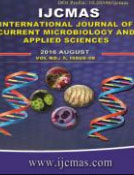


 National Academy of Agricultural Sciences (NAAS)
National Academy of Agricultural Sciences (NAAS)

|
PRINT ISSN : 2319-7692
Online ISSN : 2319-7706 Issues : 12 per year Publisher : Excellent Publishers Email : editorijcmas@gmail.com / submit@ijcmas.com Editor-in-chief: Dr.M.Prakash Index Copernicus ICV 2018: 95.39 NAAS RATING 2020: 5.38 |
Urinary Tract Infections (UTI) are one of the commonest bacterial infections; the members of the family Enterobacteriaceae are the most frequent pathogens detected causing UTI. Gram-negative bacteria pose a therapeutic problem not only in the hospital settings, but also in the community as they have acquired resistance to multiple antibiotics. The aim of the study was to assess the prevalence of Gram Negative Bacteria (GNB) causing urinary tract infections and their multiple drug resistance due to ESBL and Carbapenemase production. Bacterial isolates were recovered from the adult patients admitted and attending the Civil Hospital Aizawl, Mizoram for Urinary Tract Infections. Total of 152 GNB isolates were recovered and dominating the entire isolates of UTI pathogens included in this study (p <0.05 (one-tail) and screed for the percentage of Multi Drug Resistance which was also found showing significant increase among the isolates. (p <0.01). There was tendency showing high resistance against cephalosporins, which may be due to the ESBL and carbapenemase enzyme producing capacity by the isolates. The strains belonged to Escherichia coli, Klebsiella spp. were found contributing the higher percentages to the enzymes production. (p < 0.001). In summary, the GNB isolates causing UTI recovered from the study region are more notorious and it suggests taking measures to control the further spread of MDR isolates which may be emerging as an important challenge in health care facilities.
 |
 |
 |
 |
 |